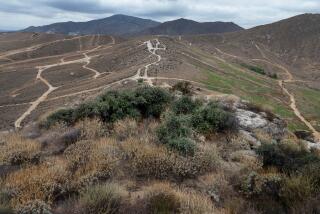New Slow-Growth Law Has Much Longer Life Than Anyone Realized
San Diego city lawyers, coming to the defense of Proposition A, are claiming a longer life for the new slow-growth law than even its proponents had asserted.
The initiative, adopted by a wide margin in the November election, was advertised by its boosters as giving the public a controling vote on whether land in the city’s 52,000-acre urban reserve could be developed before 1995.
But the city attorney’s office, in legal papers filed late Thursday, says neither the city’s General Plan--nor the initiative’s requirement for a public vote to change the plan as it relates to the urban reserve--necessarily expires in 1995.
Instead, the city says that date appears in the General Plan as a “target” for its planning and development goals, “subject to periodic review and updating.”
Both supporters and opponents of Proposition A said Friday that the legal claim--part of a filing that asks the San Diego County Superior Court to dismiss a lawsuit challenging the initiative’s legality--marks the first time the city has claimed a life longer than a decade for the growth-management law.
Jay Powell, conservation coordinator for the Sierra Club, said lawyers had told proponents of the initiative during last fall’s campaign that both Proposition A and the General Plan would be in effect only until 1995.
But Powell said the initiative’s supporters clearly had no objection to its life being extended.
“The purpose of the plan is to provide orderly growth,” he said. “Proposition A is a mechanism so that when we want to grow, there’s a mechanism to do that.”
However, Louis Wolfsheimer, one of the attorneys for the developer challenging the initiative, said the city’s assertion raised doubts about whether the public understood what it was voting on when it approved Proposition A by a 56%-44% margin.
“This is the first time the city has admitted that the proposition does not end in 1995, as some of the proponents led the voters to believe,” Wolfsheimer said. “Some of the proponents said they would not support it if that were the case.”
Wolfsheimer’s client, University Development Inc., contends that the initiative is unconstitutional whatever its life span.
The lawsuit filed in March by the company, a for-profit arm of Campus Crusade for Christ, says Proposition A illegally strips it of the City Council’s prior OK to develop a Christian university and an industrial park on land it owns in the urban reserve west of Rancho Bernardo.
The council approved a General Plan amendment allowing the 1,750-acre La Jolla Valley project in September, 1984. But Proposition A requires a public vote approving such amendments for development in the reserve after Aug. 1, 1984.
University Development says the initiative has deprived it of $70 million of the property’s $130 million value. The company’s suit asks the court to either void the ballot measure or order the city to pay $70 million in damages.
But the city, in its newly-filed legal arguments, contends that California law does not guarantee landowners protection from land-use regulations that prevent them from garnering the highest possible return from their property.
Moreover, the city says, University Development is premature in challenging the initiative. A developer should not be able to test the law, the city argues, until voters have rejected its proposal.
More to Read
Sign up for Essential California
The most important California stories and recommendations in your inbox every morning.
You may occasionally receive promotional content from the Los Angeles Times.










